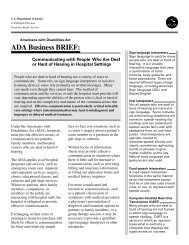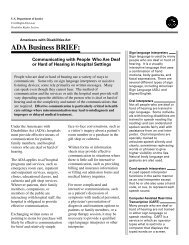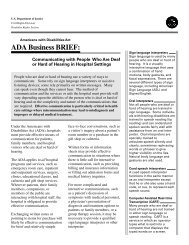Test - 1
You also want an ePaper? Increase the reach of your titles
YUMPU automatically turns print PDFs into web optimized ePapers that Google loves.
Communicating with People Who Are Deaf or Hard of Hearing in Hospital Settings (continued)<br />
Situations where an interpreter<br />
may be required for effective<br />
communication:<br />
• discussing a patient’s<br />
symptoms and medical<br />
condition, medications, and<br />
medical history<br />
• explaining and describing<br />
medical conditions, tests,<br />
treatment options,<br />
medications, surgery and<br />
other procedures<br />
• providing a diagnosis,<br />
prognosis, and<br />
recommendation for<br />
treatment<br />
• obtaining informed consent<br />
for treatment<br />
• communicating with a<br />
patient during treatment ,<br />
testing procedures, and<br />
during physician’s rounds<br />
Hospitals may need to provide an<br />
interpreter or other assistive<br />
service in a variety of situations<br />
where it is a family member or<br />
companion rather than the patient<br />
who is deaf or hard of hearing.<br />
For example, an interpreter may be<br />
necessary to communicate where<br />
the guardian of a minor patient is<br />
deaf, to discuss prognosis and<br />
treatment options with a patient’s<br />
spouse or partner who is hard of<br />
hearing, or to allow meaningful<br />
participation in a birthing class for<br />
a prospective new father who is<br />
deaf.<br />
Individuals with hearing<br />
disabilities have different<br />
communication skills and the<br />
hospital should consult with each<br />
individual to determine what aids<br />
or services are necessary to<br />
provide effective communication<br />
in particular situations.<br />
It is inappropriate to ask family<br />
members or other companions to<br />
interpret for a person who is deaf<br />
or hard of hearing. Family<br />
members may be unable to<br />
interpret accurately in the<br />
emotional situation that often<br />
exists in a medical emergency.<br />
Hospitals should have<br />
arrangements in place to ensure<br />
that qualified interpreters are<br />
readily available on a scheduled<br />
basis and on an unscheduled basis<br />
with minimal delay, including<br />
on-call arrangements for<br />
after-hours emergencies. Larger<br />
facilities may choose to have<br />
interpreters on staff.<br />
• providing instructions for<br />
medications, post-treatment<br />
activities, and follow-up<br />
treatments<br />
• providing mental health<br />
services, including group or<br />
individual therapy, or<br />
counseling for patients and<br />
family members<br />
• providing information about<br />
blood or organ donations<br />
• explaining living wills and<br />
powers of attorney<br />
• discussing complex billing or<br />
insurance matters<br />
• making educational<br />
presentations, such as<br />
birthing and new parent<br />
classes, nutrition and weight<br />
management counseling,<br />
and CPR and first aid training<br />
Sign language or other<br />
interpreters must be<br />
qualified. An interpreter<br />
is qualified if he or she<br />
can interpret<br />
competently, accurately,<br />
and impartially. In the<br />
hospital setting, the<br />
interpreter must be<br />
familiar with any<br />
specialized vocabulary<br />
used and must be able to<br />
interpret medical terms<br />
and concepts. Hospital<br />
personnel who have a<br />
limited familiarity with<br />
sign language should<br />
interpret only in<br />
emergency situations for<br />
a brief time until a<br />
qualified interpreter can<br />
be present.<br />
A doctor uses a sign language interpreter to<br />
communicate with a patient who is deaf.<br />
2














